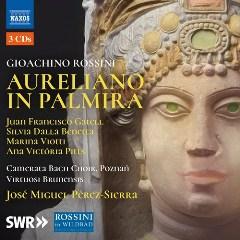Rossini - Aureliano in Palmira (2018)
Rossini - Aureliano in Palmira (2018)

1.Sinfonia 6:58 2.Act I: Sposa del grande Osiride 15:28 3.Act I: Secondino gli dei 0:33 4.Act I: Stava, dirà la terra 3:57 5.Act I: Marcia 1:13 6.Act I: Vivi eterno, oh grande Augusto 1:12 7.Act I: Romani, a voi soltanto - Cara patria! 6:31 8.Act I: Olà. Venga, e si ascolti 2:14 9.Act I: Pensa che festi a Roma 9:02 10.Act I: Giorno di gloria è questo 2:18 11.Act I: Venga Zenobia, oh Cesare 1:37 12.Act I: Cesare, a te mi guida 2:26 13.Act I: Cedi, cedi; a lui t'arrendi... 1:04 14.Act I: Ah! no; voi lo sperate invano 1:31 15.Act I: Là pugnai; la sorte arrise 7:46 16.Act I: Chi mai creduto avria 2:05 17.Act I: Eccomi, ingiusti numi 25:23 18.Act II: Del cielo, ahi! miseri! 2:38 19.Act II: Tutto è perduto 3:11 20.Act II: Se udir volessi, ingrata 0:37 21.Act II: Se libertà t'è cara 5:47 22.Act II: Corri Augusto 3:50 23.Act II: L'Asia in faville è volta 7:04 24.Act II: Dolci silvestri orrori 3:34 25.Act II: Perché mai le luci aprimmo 3:47 26.Act II: Qual lieto suono!... 1:26 27.Act II: Ah! non posso 2:46 28.Act II: Non lasciarmi in tal momento 2:10 29.Act II: La sicurezza tua 2:29 30.Act II: Corrasi... 0:39 31.Act II: Più non vedrà quel perfido 6:02 32.Act II: Vedesti? Oh come irato 2:22 33.Act II: Inutil ferro!... 3:47 34.Act II: Mille sospiri e lagrime 4:16 35.Act II: Giunge Augusto... 8:42 36.Act II: È deciso il destino 0:43 37.Act II: Non mi lagno, che il mio bene 3:10 38.Act II: Scacciar mi è forza alfine 1:34 39.Act II: Nel tuo core unita sia 0:46 40.Act II: I prigionieri a me 1:05 41.Act II: Copra un eterno oblìo 2:56 Aureliano - Juan Francisco Gatell, Tenor Zenobia - Silvia Dalla Benetta, Soprano Arsace - Marina Viotti, Mezzo-soprano Publia - Ana Victória Pitts, Mezzo-soprano Oraspe - Xiang Xu, Tenor Licinio - Zhiyuan Chen, Bass High Priest - Baurzhan Anderzhanov, Bass Camerata Bach Choir, Poznań Virtuosi Brunensis José Miguel Pérez-Sierra - conductor Music Assistant and Fortepiano - Fabio Maggio
Aureliano in Palmira is unique in Rossini’s oeuvre for its inclusion of the only role, Arsace, that Rossini wrote for the castrato voice. Its tale of tragic defeat and the ultimate nobility and triumph of love in seemingly impossible circumstances is a refined and highly innovative example of his style.
Set amidst turbulent times in the Roman Empire, Aureliano in Palmira is packed with sublime arias, duets of haunting beauty (notably the three given to Arsace and Zenobia) and excellent choruses, Rossini himself considering this work as ‘divine music’. Even after initial success he re-used many of its melodies in later operas, most famously in Il barbiere di Siviglia. ---prestomusic.com
Having enjoyed success in Venice with Tancredi and L’Italiana in Algeri, Rossini returned to write operas for La Scala, Milan, including Aureliano in Palmira. Although it was to achieve subsequent performances around Europe, it was a failure in Milan at its first performance, and that was a harbinger for its eventual fall from the repertoire, a vision the composer foretold by subsequently using music for his later works, including the Overture which we subsequently find in The Barber of Seville. The story had certainly not fired Rossini to produce his finest music, Zenobia, the Queen of Syria, being at the centre of a typical love triangle that goes through many trials and tribulations before a totally improbable happy ending. Though it has been recorded once before, this new release is derived from three concert performances in the 2017 Rossini in Wildbad Festival. At this juncture I would agree that it is certainly not among the composer’s masterpieces, but its almost total neglect is unjust, though it has one massive drawback—particularly when deprived of stage action—by having to use a mezzo-soprano for the male role of Arsace, the part having been composed for a male castrato. So the big first act confrontation between the two male protagonists—Aureliano and Arsace—becomes a male/female encounter, the part of Arsace here taken by a very female sounding voice from the admirable Marina Viotti. It was in the more lengthy sections that Rossini seemed to get bogged down, though the long Introduction, where the major characters relate the story that has already taken place, is far too long, while the final section of the first act lasts not far short of half an hour. The performance was certainly fortunate in having the virile tenor voice of Juan Francisco Gatell as the Roman Emperor, Aureliano, though the steely voice of Silvia Della Benetta as Zenobia would have struck terror into the heart of her prospective lovers. The Camerata Bach Choir is in excellent voice, and after an overture, where the fast tempo of the conductor, José Miguel Pérez-Sierra, took the Virtuosi Brunensis out of their comfort zone, the orchestra is in fine form. The recording has the singers well to the fore, but I do so wish the tepid interruptive applause had been edited out. ---David Denton, naxos.com
download (mp3 @320 kbs):








